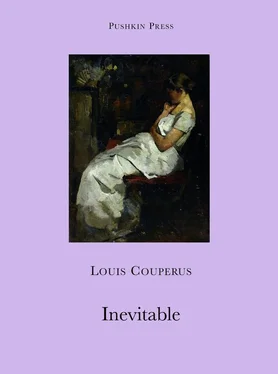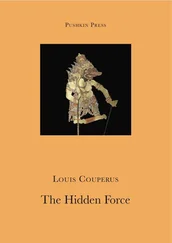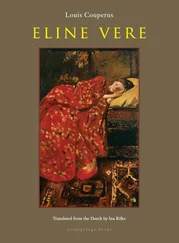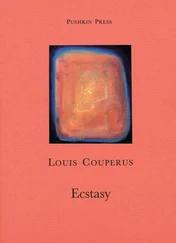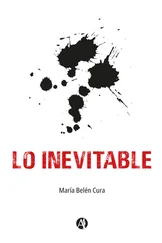“He was a morose monster. But why must I tell you about him?”
“Because otherwise I have no interest in those arches and chambers.”
“Then let’s go and sit upstairs, in the garden.”
And that was what they did.
“Can’t you feel Rome here?” he asked.
“Everywhere I feel myself,” she replied.
But he did not seem to hear her.
“It’s the atmosphere,” he went on. “You should forget our hotel for a change, Belloni and all our fellow-guests, and yourself. When someone first arrives, they have all the fuss of a hotel, rooms, restaurants, vaguely sympathetic or uncongenial people. That’s what you had. Forget it. And try to just feel the atmosphere of Rome. It’s as though the atmosphere has stayed the same here, despite the fact that the centuries are piled one on top of the other. Once the Middle Ages covered the antiquity of the Forum, and now it is hidden everywhere by our nineteenth-century mania for tourism. That is Miss Hope’s orange lining. But the atmosphere has remained the same throughout. Or am I imagining it? …”
She said nothing.
“Perhaps,” he continued. “But what do I care? Our life is imagination, and imagination is beautiful. The beauty of our imagination belongs to us, who are not people of substance, our life’s consolation. How marvellous to dream all one’s life, dream about what happened in the past. The past is what is beautiful. The present is not real, does not exist. And the future doesn’t interest me.”
“Don’t you think about modern issues then?” she asked.
“Feminism?” he asked. “Socialism? Peace?”
“For example.”
“No,” he smiled. “I think of them sometimes, but not about them.”
“What do you mean?”
“I can’t get on with them. That’s the way I am. My nature is to dream, and the Past is my great dream.”
“Don’t you dream about yourself?”
“No. About my soul? My innermost core? No. It doesn’t interest me much.”
“Have you ever suffered?”
“Suffered? Yes, no. I don’t know. I suffer about my complete uselessness as a human being, as a son, as a man, but when I dream, I’m happy.”
“How do you come to be speaking so frankly to me?”
He looked at her in astonishment.
“Why should I hide?” he asked. “I either don’t talk, or I talk as I am talking now. Perhaps it’s a bit peculiar.”
“So do you speak so confidentially to everyone?”
“No, to almost no one. I used to have a friend, but he’s dead. Tell me, I expect you find me a pathological case?”
“No, I don’t think so.”
“It wouldn’t matter to me if you did. Oh, how beautiful it is here. Are you breathing in the spirit of Rome?”
“What Rome?”
“The Rome of antiquity. Below us is the palace of Tiberius. I can see him walking along with his prying eyes — he was very strong, very morose, and he was a monster. He had no ideals. Further that way is the palace of Caligula, a brilliant madman. He built a bridge over the Forum to be able to speak to Jupiter on the Capitol.
You couldn’t do that today. He was brilliant and crazy. If you’re like that, you have much that is wonderful.”
“How can you find an age of emperors who were monsters and mad, wonderful?”
“Because I can see their age before me, in the past, as a dream.”
“How can you possibly not see the present before you, and the issues of this age, especially that of eternal poverty?”
He looked at her.
“Yes,” he said. “I know, that is the rottenness in me, the sin. The notion of eternal poverty doesn’t affect me.”
She looked at him, almost with contempt.
“You are not of your age,” she said coolly.
“No …”
“Have you ever been hungry?”
He laughed and shrugged his shoulders.
“Have you ever put yourself in the place of a worker, or factory girl, working till they’re exhausted, old, half dead for scarcely a crust of bread?”
“Oh, those things are so gruesome and so ugly: don’t talk about them!” he begged.
Her eyes were cool, her lips pursed with disgust and she got up.
“Are you angry?” he asked meekly.
“No,” she said softly. “I’m not angry …”
“But do you despise me for being a useless creature full of aestheticism and daydreams?”
“No. Who am I to blame you for your uselessness?”
“Oh, if only we could find something!” he exclaimed, almost in rapture.
“What?”
“A goal. But mine would always remain beauty. And the past.”
“And if I had the strength to devote myself to a goal, then the main aim would be: bread for the future.”
“How awful that sounds!” he said, impolite in his honesty. “Why on earth didn’t you go to London or Manchester, or some black industrial hole?”
“Because I didn’t have the strength and think too much about myself, about the unhappiness I’ve just been through. And I thought I would find some distraction in Italy.”
“And that’s your disappointment … But perhaps you’ll gradually grow stronger, and you’ll devote yourself to your goal: bread for the Future. I shan’t envy you, though: Bread for the Future …”
She was silent, and he said coolly,
“It’s getting late. Let’s go home …”
DUCO VAN DER STAAL had rented a large, cavernous studio in Via del Babuino, three flights up, north-facing and chilly. Here he painted, modelled, studied, here he gathered together everything beautiful and ancient he could find in the shops along the Tiber or in the Mercato dei Fiori. It was his passion: hunting through Rome for a portion of an old triptych or an ancient fragment of sculpture. In this way his studio had not remained the great, cold, echoing workplace that testifies to diligent and serious study, but had become a refuge for a vaguely coloured past and classical art, a museum for his dreamy spirit. Even as a child, as a boy, he had felt this passion for antiquity growing in himself, had nosed around in the shop of an old Jew, had learned to haggle when he was short of cash, and collected at first worthless trinkets, later, slowly, objects of artistic and financial value. He was a devotee: it was his only vice: he spent all his pocket money on it, and later, without reservations, the little he earned. Because sometimes, very occasionally, he completed something and sold it. But usually he was too dissatisfied with himself to finish things, and it was his humble idea that everything had already been created, and that his art was useless.
This idea sometimes paralysed him for months, without making him unhappy. As long as he had a little money to keep body and soul together — and his needs were extremely few — he felt rich and was happy in his studio or wandered happily through Rome. His tall, nonchalant, sinewy and slim body would be dressed in his oldest suit, which, without affectation, revealed a slovenly sports shirt and a tie like a length of string; a hat of indeterminate colour and bedraggled shape was his favourite headgear.
His mother and sisters did not usually consider him presentable, but had given up trying to transform him into the elegant son and brother that they would have loved to take into the drawing-rooms of their Roman acquaintances. Happy to breathe in the atmosphere of Rome he wandered for hours among the ruins, and saw — a dazzling vision of dreamy columns — ethereal temples and palaces of marble rising transparently in a shimmering sunny twilight, and tourists following a trail taken from their Baedeker who passed this tall, skinny young man sitting nonchalantly on the foundations of the temple of Saturn would never have believed his illusions about architecture: harmoniously rising lines, crowned with a theory of sculpture of noble, divine gestures, high in the blue sky.
Читать дальше
